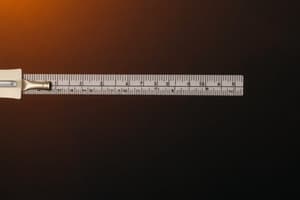Podcast
Questions and Answers
What will students investigate by designing simple experiments?
What will students investigate by designing simple experiments?
- Properties of light and how it produces shadows
- Body movements and the air around us
- Motion, including its speed, direction, and velocity (correct)
- Electricity and circuits
Which tool will students use to explore the principles of reflection, refraction, and shadows?
Which tool will students use to explore the principles of reflection, refraction, and shadows?
- Magnifying glasses
- Rulers and calculators
- Mirrors and flashlights (correct)
- Microscopes
What skills will students develop throughout these units?
What skills will students develop throughout these units?
- Cooking, gardening, and painting
- Coding, robotics, and engineering
- Singing, dancing, and drawing
- Collaboration, communication, and critical thinking (correct)
How will students use the scientific method in these units?
How will students use the scientific method in these units?
What foundational concepts will students have by the end of this adventure through Science Class 6?
What foundational concepts will students have by the end of this adventure through Science Class 6?
What is the primary purpose of students participating in simple exercises as part of the Body Movements unit?
What is the primary purpose of students participating in simple exercises as part of the Body Movements unit?
Which unit involves students observing air's influence on objects through experiments?
Which unit involves students observing air's influence on objects through experiments?
What will students learn about in the Electricity and Circuits unit related to circuit components?
What will students learn about in the Electricity and Circuits unit related to circuit components?
Which concept are students expected to explore in the Measurement of Distance and Motion unit?
Which concept are students expected to explore in the Measurement of Distance and Motion unit?
In which unit will students be introduced to the relationships between distance, time, and speed?
In which unit will students be introduced to the relationships between distance, time, and speed?
Study Notes
Science Class 6: Exploring Our World
In Grade 6, science takes on an exciting new dimension as students delve into the mysteries of our world through hands-on experiments, investigations, and discussions. Let's explore some of the key concepts covered in this age group:
Body Movements
- Students will learn about their body's muscular and skeletal systems, understanding how they work together to allow movement.
- They'll discover the importance of exercise and physical activity for good health.
- As part of this unit, students will participate in simple exercises to understand the concepts of agility and flexibility.
Air Around Us
- Students will develop an understanding of air as a vital component of our environment.
- They'll learn about the properties of air, such as its composition, pressure, and temperature.
- By performing experiments, students will observe air's influence on objects (e.g., air resistance).
Electricity and Circuits
- Students will explore the basics of electricity, including its sources, transfer, and the role of conductors and insulators.
- Through simple circuit experiments, students will learn about series and parallel circuits, batteries, and bulbs.
- They'll also learn about the importance of safety when working with electricity.
Measurement of Distance and Motion
- Students will learn how to accurately measure distance, time, and speed using standard units.
- They'll explore the relationships between these variables.
- By designing simple experiments, students will investigate motion, including its speed, direction, and velocity.
Light, Shadow, and Reflection
- Students will learn about the properties of light, including how it travels, reflects, and produces shadows.
- They'll use simple tools, such as mirrors and flashlights, to explore the principles of reflection, refraction, and shadows.
- Students will also learn about the importance of these concepts in everyday life and technology.
Throughout these units, students will use the scientific method to formulate questions, collect data, analyze evidence, and draw conclusions. They'll also develop skills in collaboration, communication, and critical thinking.
By the end of this adventure through Science Class 6, students will have a solid foundation in the key concepts of their world, one that will serve them well as they continue their scientific journey in the years ahead.
Studying That Suits You
Use AI to generate personalized quizzes and flashcards to suit your learning preferences.
Description
Test your knowledge of key concepts covered in Grade 6 Science, such as body movements, air properties, electricity basics, measurement of distance and motion, and light principles. Explore the mysteries of our world through this quiz!




